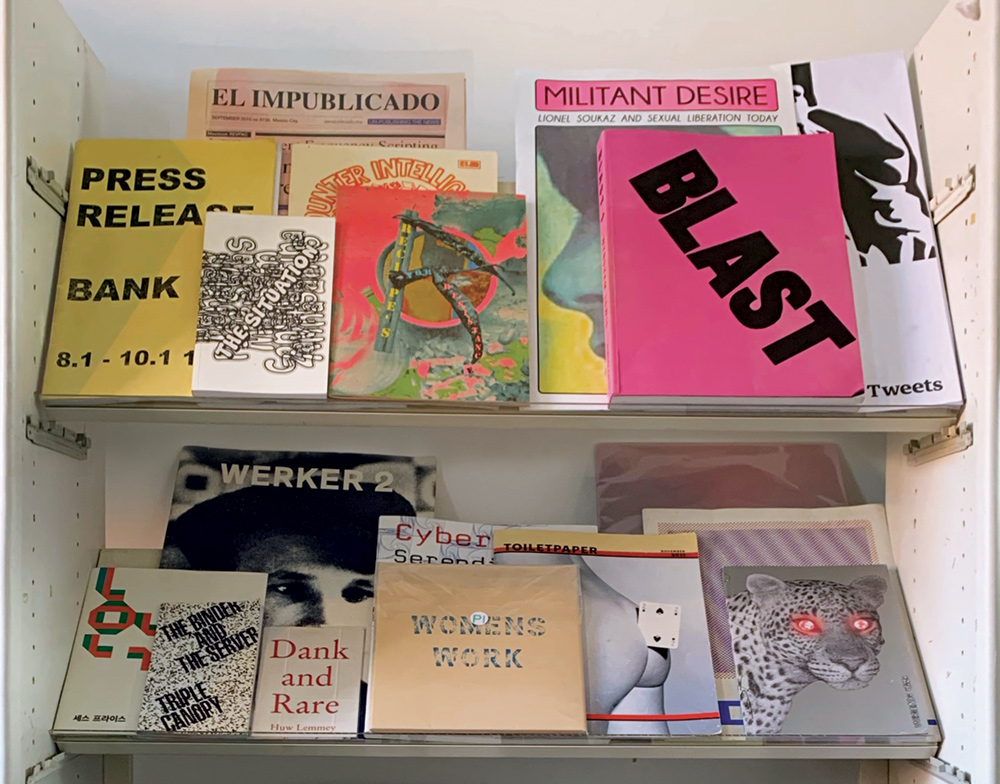The Digital Archive of Artists’ Publishing (DAAP) is an interactive, user-driven, searchable database of artists’ books and publications, that acts as a hub to engage with others, built by artists, publishers and a community of creative practitioners in contemporary artists’ publishing, developed via an ethically-driven design process, and supported by Wikimedia UK and Arts Council England.

A collaborative project, with the support of Wikimedia UK, DAAP is inspired by the site of Banner Repeater’s public Archive of Artists’ Publishing on Hackney Downs train station, with 11,000 people passing a day, in response to the need for a similarly dynamic approach to archiving in an online context.
We have drawn upon the working knowledge of users and archivists alike, to develop a database with sufficient complexity, whilst remaining searchable, that affords multiple histories to develop, confronting issues of authorship and representation, whilst addressing the challenges of cataloguing often deliberately difficult to categorise materials. With an emphasis on inclusivity from the start, we aim to privilege anecdotal histories and multiple perspectives alongside factual data, whilst the wiki style approach means that users can upload their own material, single items, or entire collections, choosing appropriate sharing permissions at time of upload.
Utilising the open-source software Wikibase, DAAP brings to the surface new and unexpected data connections across diverse collection artefacts, providing a resource to link to other archives, and communities, whilst visualisation tools offer exciting visual diagrams for in-depth research. DAAP implements a custom frontend interface on top of the Wikibase database, which follows familiar user interface metaphors, increasing accessibility across a broader audience.
DAAP is committed to challenging the politics of traditional archives that come of issues regarding inclusion and accessibility, from a de-colonial, critical gender and LGBTQI perspective. The project will work to ensure an equitable and ethical design process occurs throughout the archive development.
Artists' Publishing is incredibly complex, to the extent that each item could almost warrant a new category of its own, making visible the challenges in sharing deliberately difficult to categorise material. DAAP brings together scholars and practitioners in the field of art, artist’s publishing and creative technology to set a precedent for modelling bespoke and non-standardised artist publications as linked data. Linked open data is data that is machine-readable, published online following specific interoperability standards, and published with an open license thus enabling others to connect to it.
The project has developed through an interrogation of how an informed use of open-source linked data technology can be utilised towards a more ethically driven archival process.
Utilising a linked data database for the digital platform enables data to be structured in flexible ways, which can grow and develop organically around community needs, rather than conforming to rigid, pre-existing bibliographic standards. Traditional ‘standards’ aim to structure bibliographic data in ways that make it possible to find publications online, but as is increasingly clear, technology is not neutral, with an active tendency to reproduce existing bias’ and discriminations already existing in the world today. How search criteria, and other structural aspects of archiving contribute to this, is an ongoing conversation that drives the development of the archive, drawing from the experiences of users, archivists and technologists, alike.
One such development; the non-hierarchical model of a linked data database allows for anecdotal histories to be added in such a way that problematises a single universal history, instead prioritising a multiplicity of voices. The version control system embedded within the DAAP platform also allows for changes to the data to be reverted to at any point, so that the archive can become a living dynamic structure, rather than fixed in a single static state, determined by a central authority.
The native features of the linked data environment have been activated within a communal practice, in order for the project to support an equitable, and ethical design process throughout the archive development. This in itself, is a vital and ongoing conversational process, in which mistakes can be made, discussed and rectified. Workshops have facilitated much of these conversations so far, with a host of users, as well as experts, joining in discussion and debate, which will continue as the archive continues to grow.
DAAP developed from critique regarding the extractive relations of digital neo-colonialisms, as well as historical colonialisms, since 2010, and we are strongly committed to challenging the politics of traditional archives that come of issues regarding inclusion and accessibility, from a de-colonial, critical gender and LGBTQI perspective.
The development of the technical infrastructure draws heavily on the PhD Research work of our Technical lead Lozana Rossenova, conducted at digital arts organization Rhizome, who have been using Wikibase as archival platform since 2015.
The DAAP is a non-profit initiative and we want to keep the DAAP open, accessible and available to all. To keep running and improving the DAAP platform, we need your support. Find out more on our Support page.
Read more about the team behind the project, the Advisory Panel and the partner organisations on our Team page.
We have initiated a dedicated Telegram group to facilitate discussions around data entry and the ethics of archiving in between the workshop sessions. Get in touch if you’d like to join the channel.
We enforce a strict Code of Conduct throughout our public events both in person and online. Read the full CoC text here.